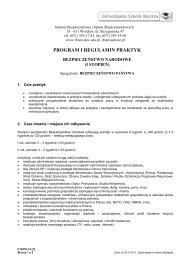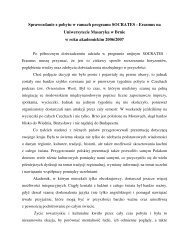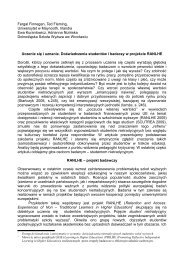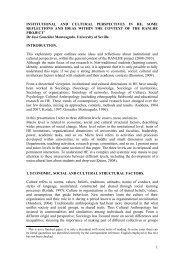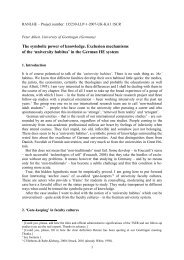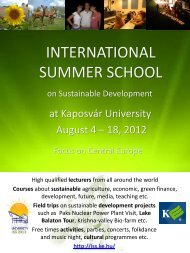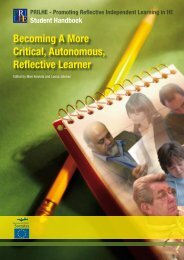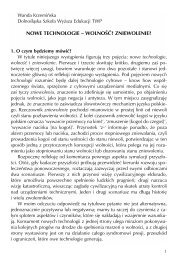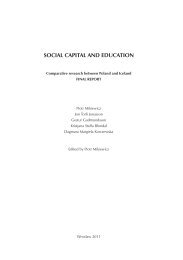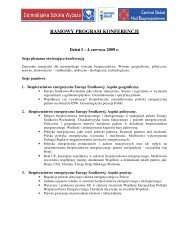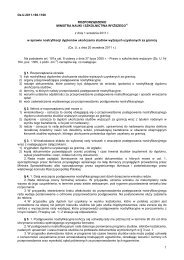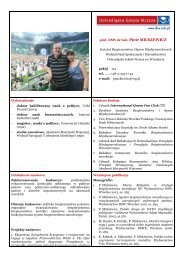Becoming A More Critical, Autonomous, Reflective Learner
Becoming A More Critical, Autonomous, Reflective Learner
Becoming A More Critical, Autonomous, Reflective Learner
You also want an ePaper? Increase the reach of your titles
YUMPU automatically turns print PDFs into web optimized ePapers that Google loves.
PRILHE Project - Lecturer’s Toolkit<br />
2.2 Meso Level<br />
This section looks at how facilities, strategies, policies and practices at the institutional level can help support and encourage the<br />
development of <strong>Critical</strong> <strong>Autonomous</strong> <strong>Reflective</strong> Learning amongst adult students. Internal factors, such as institutional departmental<br />
structures and cultures, shape higher education institutions at the meso level. However, universities do not exist in a vacuum -<br />
external factors also play a role in shaping a particular institution, such as its relationship with the local community, regional,<br />
national and European policies (Bourgeois et al, 1999). Higher education institutions across Europe are transforming, albeit<br />
reluctantly in some cases, as a result of changing state/university relationships, economic and social changes and globalisation.<br />
Externally universities are now engaging with other sites of knowledge producers while internally new student groups are entering<br />
through the doors as universities change from elite to mass-based institutions (Trow, 1973, Scott, 1995). As Barnett points out;<br />
‘institutional boundaries become less tight as interrelationships with the wider society grow’ (2003: 27). ‘The nature and purpose<br />
of universities in postmodernity is, therefore, being questioned, redefined and reconstructed. Yet despite these change processes,<br />
hierarchies continue to exist with some universities remaining elite institutions’ (Merrill & Alheit, 2004: 153).<br />
Institutional policies, ethos and practices all project an image and a message of what a particular university is like and what it<br />
stands for. For many adults the institutional culture of elite, traditional universities is off-putting as they feel that this type of<br />
institution is ‘not for the likes of them’. This is related to class issues which undermine their confidence in learning in such<br />
institutions. As a result the majority of adult students opt for studying in reform universities (or the ‘new’ universities in the UK)<br />
which has consequences for their labour market potential. For a student to succeed in their learning, higher education institutions<br />
need to create a welcoming environment - and they need to be socially inclusive to all social groups and ages. A university’s<br />
mission statement and publicity about its programmes needs to state explicitly that adult students are welcomed and valued.<br />
Universities are complex institutions and while an institution as a whole has a specific culture, individual departments also have<br />
their own cultures which may or may not reflect the institutional culture as academic faculties and departments in many<br />
universities remain autonomous. For Duke, ‘This means looking at the university in terms of interdependent competing coalitions,<br />
each seeking to win by imposing their interests on the larger system of the institution as a whole’ (2004:201). Departmental<br />
cultures are shaped and influenced by disciplines (Becher, 1989) and, as a result, departments differ in their attitudes towards<br />
adult students (Williams, 1997, Bourgeois et al, 1999). Becher (1989), drawing on a cultural approach in understanding university<br />
organisational behaviour and environment, therefore, argues that ‘there is a strong relationship between the discipline (knowledge<br />
community) and the epistemological characteristics of the discipline (knowledge form)’ (Bourgeois et al, 1999: 149). Departments<br />
are characterised by their own sub-cultures which embody particular values, attitudes, norms, codes of conduct etc. and lecturers<br />
are socialised into these.<br />
Bourdieu’s (1984) work on French universities highlights the fact that the social space of the academic field is constructed by a<br />
range of symbolic capital, which defines the social prestige a particular discipline has, and by intellectual capital, which marks the<br />
scientific ranking of the discipline. Adult students are often only able to enter traditional universities through the low or ‘soft’ status<br />
disciplines such as the social sciences (Bourgeois et al, 1999). Departments, through admission tutors, can also act as<br />
gatekeepers keeping non-traditional students out of their departments (Williams, 1997). If non-traditional adult students do<br />
manage to enter the high status disciplines the departmental culture may make them feel that they are not wanted or valued.<br />
Departmental cultures or, as Becher (1989) terms it, ‘academic tribes’ are significant in encouraging or not encouraging the<br />
participation of adult students in higher education. In looking at the access, and the participation of adults in higher education,<br />
Bourgeois et al stress:<br />
the differences that are observed in adult access policies and practices across institutions and in sub-units within<br />
institutions can, therefore be explained to a large extent in the light of the interplay of power relationships and<br />
strategies displayed by the various interest groups in the decision-making processes that underpin these policies and<br />
practices<br />
(1999: 147).<br />
14<br />
<strong>Becoming</strong> A <strong>More</strong> <strong>Critical</strong>, <strong>Autonomous</strong>, <strong>Reflective</strong> <strong>Learner</strong>




